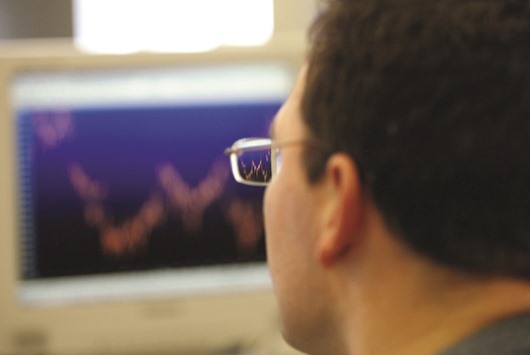Oil prices took a battering yesterday, with US prices falling below $50 for the first time this year, on signs a global supply glut is not going away.
The euro, meanwhile, rallied briefly against the dollar as the ECB said it no longer saw a deflation threat and would end some of its massive support for the eurozone economy.
Equities were under pressure during Asian and much of European trading after as a closely-watched report showed a shock surge in US oil inventories, rekindling worries about the oversupply that has hammered the crude market since mid-2014.
The Energy Department on Wednesday revealed a whopping eight-million barrel increase in supplies over the past week — four times more than expected — owing to higher domestic production and increased stockpiling.
Both main oil futures contracts slumped to lows not seen since the end of last year and sending New York prices sliding below $50 a barrel.
In Thursday trading, shares in oil giant Royal Dutch Shell shed 2.0% and rival BP lost 1.5% on the London stock market. The FTSE 100 index was weighed down 0.3% also by falling mining shares at 7,314.96 points.
Frankfurt’s DAX 30 was up 0.09% at 11,978.39 points, Paris’ CAC 40 was up 0.4% at 4,981.51 points and the
EURO STOXX 50 was up 0.6% at 3,409.95 points at close.
Asian energy firms had already taken a hit, with Japan’s Inpex shedding 1.2%, Hong Kong-listed PetroChina diving 2.2% and CNOOC losing 1.8%.
Woodside Petroleum fell 1.1% in Sydney and later in European activity, French energy group Total slid 0.8%.
Meanwhile, US stocks drifted upwards yesterday after data on new US jobless claims last week indicated a healthy labour market, beefing up expectations for a positive key government jobs report on Friday and the likelihood the Federal Reserve will hike interest rates next week.
The European Central Bank, as widely expected, kept interest rates at historically low levels and its massive bond-buying quantitative easing (QE) programme to support for the eurozone economy intact, despite growing evidence the health of the bloc is improving. That helped eurozone equities perk up in afternoon trading.
The ECB increased its forecast for growth in the eurozone this year to 1.8% and now expects inflation of 1.7% — close to its target of just under 2.0%.
The euro spiked higher, gaining more than 50 cents to briefly break above $1.06, after ECB chief Mario Draghi signalled that the central bank no longer sees an urgent need to undertake any additional measures to support the economy.

A trader monitors stock prices on the trading floor of the Vienna Stock Exchange. The EURO STOXX 50 was up 0.6% at 3,409.95 points at close yesterday.
